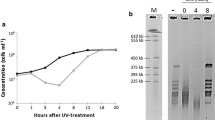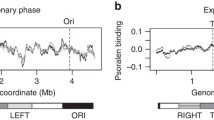Abstract
Heat treatment of wild-type Escherichia coli cells led to a transient relaxation of negatively supercoiled plasmid DNA and there was no recovery of DNA torsional strain in the DNA in gyrA mutant cells. After heat treatment, DnaK and GroEL proteins were synthesized continuously in the gyrA mutant cells, whereas they were synthesized only transiently in wild-type cells. Thus, change in superhelical density of the DNA correlated with the temperature-induced expression of heat shock proteins. Inhibitors of DNA gyrase (nalidixic acid, novobiocin), an organic solvent (ethanol) and a psychotropic drug (chlorpromazine) all stimulated relaxation of cellular DNA over the same concentration range that induces heat shock proteins. As DNA relaxation was induced by heat treatment or chemicals in an rpoH mutant, the process is not the result of induced synthesis of heat shock proteins.
Similar content being viewed by others
References
Ashburner M (1982) The effects of heat shock and other stress on gene activity. In: Schlesinger MJ, Ashburner M, Tissieres A (eds) Heat shock — From bacteria to man, Cold Spring Harbor Laboratory, Cold Spring Harbor New York, pp 1–8
Balke VL, Gralla JD (1987) Changes in the linking number of supercoiled DNA accompany growth transitions in Escherichia coli. J Bacteriol 169:4499–4506
Bardwell JCA, Craig EA (1984) The major heat shock gene of Drosophila and the Escherichia coli heat-shock inducible dnaK genes are homologous. Proc Natl Acad Sci USA 81:848–852
Botchan P, Wang JC, Echols H (1973) Effect of circularity and superhelicity on transcription from bacteriophage λ DNA. Proc Natl Acad Sci USA 70:3077–3081
Casadaban MJ (1976) Transposition and fusion of the lac genes to selected promoters in Escherichia coli using bacteriophage lambda and Mu. J Mol Biol 104:541–555
Craig EA, Gross CA (1991) Is hsp70 the cellular thermometer? TIBS 16:135–140
Dorman CJ, Barr GC, NiBhriain N, Higgins CF (1988) DNA supercoiling and the anaerobic and growth phase regulation of tonB gene expression. J Bacteriol 170:2816–2826
Dorman CJ, NiBhriain N, Higgins CF (1990) DNA supercoiling and environmental regulation of virulence gene expression in Shigella flexneri. Nature 344:789–792
Drlica K (1984) Biology of bacterial deoxyribonucleic acid topoisomerases. Microbiol Rev 48:273–289
Drlica K (1987) The nucleoid. In: Neidhardt FC (ed) Escherichia coli and Salmonella typhimurium. American Society for Microbiology, Washington DC, pp 91–103
Georgopoulos C, Tilly K, Drahos D, Hendrix R (1982) The B66.0 protein of Escherichia coli is the product of the dnaK + gene. J Bacteriol 149:1175–1177
Goldstein E, Drlica K (1984) Regulation of bacterial DNA supercoiling: plasmid linking numbers vary with growth temperature. Proc Natl Acad Sci USA 81:4046–4050
Grossman AD, Erickson, JW Gross CA (1984) The htpR gene product of E. coli is a sigma factor for heat-shock promoters. Cell 38:383–390
Grossman AD, Zhou Y, Gross C, Helig J, Christie GE, Calendar R (1985) Mutations in the rpoH (htpR) gene of Escherichia coli K-12 phenotypically suppress a temperature-sensitive mutant defective in the σ70 subunit of RNA polymerase. J Bacteriol 161:939–943
Higgins CF, Dorman CJ, Stirling DA, Waddell L, Booth IR, May G Bremer E (1988) A physiological role for DNA supercoiling in the osmotic regulation of gene expression in S. typhimurium and E. coli. Cell 52:569–584
Hirose S, Suzuki Y (1988) In vitro transcription of eukaryotic genes is affected differently by the degree of DNA supercoiling. Proc Natl Acad Sci USA 85:718–722
Landick R, Vaughn V, Lau ET, VanBogelen RA, Erickson JW Neidhardt FC (1984) Nucleotide sequence of the heat shock regulatory gene of E. coli suggests its protein product may be a transcription factor. Cell 38:175–182
Lindquist S (1986) The heat-shock response. Annu Rev Biochem 55:1151–1191
Lindquist S, CraigEA (1988) The heat-shock proteins. Annu Rev Genet 22:631–677
Maniatis T, Fritsch EF, Sambrook J (1982) Molecular cloning. A laboratory manual Cold Spring Harbor Laboratory Press, Cold Spring Harbor, New York
Menzel R, Gellert M (1983) Regulation of the genes for E. coli DNA gyrase: homeostatic control of DNA supercoiling. Cell 34:105–113
Miura-Masuda A, Ikeda H (1990) The DNA gyrase of Escherichia coli participates in the formation of a spontaneous deletion by recA-independent recombination in vivo. Mol Gen Genet 220:345–352
Neidhardt FC, VanBogelen RA (1981) Positive regulatory gene for temperature-controlled proteins in Escherichia coli. Biochem Biophys Res Commun 100:894–900
Neidhardt FC, VanBogelen RA, Vaughn V (1984) The genetics and regulation of heat-shock proteins. Annu Rev Genet 18:295–329
Neidhardt FC, VanBogelen RA (1987) Heat shock response. In: Neidhardt FC (ed) Escherichia coli and Salmonella typhimurium. American Society for Microbiology, Washington DC, pp 1334–1346
Parsell DA, Sauer RT (1989) Induction of a heat shock-like response by unfolded protein in Escherichia coli: dependence on protein level not protein degradation. Genes Dev 3:1226–1232
Tanji K, Mizushima T, Natori S, Sekimizu K (1992) Induction by psychotropic drugs and local anesthetics of DnaK and GroEL proteins in Escherichia coli. Biochim Biophys Acta 1129:172–176
Tobe T, Ito K, Yura T (1984) Isolation and physical mapping of temperature-sensitive mutants defective in heat-shock induction of proteins in Escherichia coli. Mol Gen Genet 195:10–16
Van Bogelen RA, Kelley PM, Neidhardt FC (1987) Differential induction of heat shock, SOS, and oxidation stress regulons and accumulation of nucleotides in Escherichia coli. J Bacteriol 169:26–32
VanBogelen RA, Neidhardt FC (1990) Ribosomes as sensors of heat and cold shock in Escherichia coli. Proc Natl Acad Sci USA 87:5589–5593
Wang JC (1985) DNA topoisomerases. Annu Rev Biochem 54:665–697
Yamamori T, Yura T (1982) Genetic control of heat-shock protein synthesis and its bearing on growth and thermal resistance in Escherichia coli K-12. Proc Natl Acad Sci USA 79:860–864
Yang HL, Heller K, Gellert M, Zubay G (1979) Differential sensitivity of gene expression in vitro to inhibitors of DNA gyrase. Proc Natl Acad Sci USA 76:3304–3308
Yura T, Tobe T, Ito K, Osawa T (1984) Heat shock regulatory gene (htpR) of Escherichia coli is required for growth at high temperature but is dispensable at low temperature. Proc Natl Acad Sci USA 81:6803–6807
Author information
Authors and Affiliations
Additional information
Communicated by K. Isono
Rights and permissions
About this article
Cite this article
Mizushima, T., Natori, S. & Sekimizu, K. Relaxation of supercoiled DNA associated with induction of heat shock proteins in Escherichia coli . Molec. Gen. Genet. 238, 1–5 (1993). https://doi.org/10.1007/BF00279523
Received:
Accepted:
Issue Date:
DOI: https://doi.org/10.1007/BF00279523




